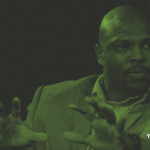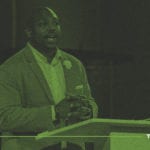I stood there with a pom-pom in my hand and yelled those haunting words: “The South will rise again!”
It’s the refrain emphatically declared at the end of “From Dixie With Love,” a former staple among University of Mississippi Rebel faithful. “The Pride of the South” marching band played it several times on game day. When we were victorious, it rang out in concert with the voices of thousands, screaming of the South’s return to Antebellum prominence. In the Ole Miss stadium it was the hymn of choice—one I sang faithfully and boldly until the day I saw my actions in stark contradiction to James Meredith’s actions in 1962.
He gave men and women who look like me a great gift—the gift of going second.
When Meredith integrated the University of Mississippi in the fall of 1962, he was the first in a long line of African Americans to call the school home. As an Ole Miss football player from 2004 to 2008, I didn’t have the burden of integrating the team. Nor did I have to endure the explicit acts of racism many before me faced. I had the gift of going second.
Today, thousands of black people are afforded this gift. Yet as the years grow on, thousands more feel the heavy yoke of pioneering, especially in the South.
Longing to Belong

As a college student, I was invited to share my testimony to a group of 70 young people in a small Tennessee church. In an effort to expose his students to diverse gospel-centered voices, the youth pastor wanted me to preach. When I arrived, an all-white adult volunteer core warmly greeted me. They were adamant about making sure I was fed and cared for. My hesitation to venture into the Southern bush for God’s work slowly melted—until I stood up to preach.
At that moment, many realized I wasn’t there as a spectator. As I began my introduction, a dozen folks stood up and walked out. I was the first African American to preach in that church. And the first to feel the stinging darts of racism from that pulpit. How I played on Saturday didn’t matter. I was black.
Many are aware of the University of Alabama’s rise to football dominance under head coach Nick Saban. Less well known is the deplorable decisions made concerning their NFL-bound and 2016 National Championship MVP, O. J. Howard. In 2011, the triple-sport athlete and top recruit was told he couldn’t take his white girlfriend to prom. Yes, you read that right—in 2011. School authorities opposed to miscegenation didn’t care about Howard’s character, or that he was committed to the best college football team in the country. It only mattered that his girlfriend was white, and he was not.
As an African American growing up in the South, one question constantly loomed over me: Whom do you belong to when you don’t belong to anyone? The same black people who shamed me for excelling academically took great pride in Bill Cosby for being a doctor on The Cosby Show. What tribe do you fit in when your white girlfriend’s parents prohibit their daughter from seeing you simply because of your skin color? Or when you’re called “white” because your diction isn’t stereotypically compatible with your ethnicity? How many brothers and sisters are too “black” to hang out with white friends and too “white” to be associated with black friends? I was caught between culture and ethnicity, trying to navigate both as rigid categories while unaware of their fluidity. So when I was called a “token,” “Uncle Tom,” or “house nigger,” I ran from my accusers. I ran from those who looked like me.
This is how I ended up in the stands screaming the words Mississippi slaveowners declared after the Civil War.
Tokenism Redefined
Tokenism refers to the superficial inclusion of underrepresented groups as an attempt to dodge criticism for the organizational omission of diversity. Such a practice elicits deserved criticism, since the “token” typically doesn’t possess legitimate power and is alone. His or her inclusion is an effort to satisfy criticism or mandated regulations. This kind of tokenism is unhelpful and perfunctory. However, social entrepreneurship occurs when one dares to step out into the chasm, grabs his tools, and begin to build bridges. The inclusion of minorities in decision-making positions doesn’t happen overnight. Minorities operating in hegemonic spaces won’t make up for decades of disproportionate hiring practices, omissions of minority pastors in homogenous churches, or segregationist leadership in secondary education. But they can be a catalyst for change. Tokenism is truly redefined when someone whose seemingly cursory hire pays it forward by generating opportunities for minorities to surpass his or her success.
What many refer to as tokenism, I call pioneering. Someone has to be the first.
When Howard’s mother decided to put her son in an all-white segregation-era private school, whites and blacks alike criticized her. But when her son was unjustly discriminated, the entire community rallied to their aid. The Howards stepped into the chasm and gave the Autauga Academy community the gift of going second. Perhaps a black man was given the gift of going second in that church I preached in, too. Redefining tokenism isn’t a call to strip away ethnicity or culture in order to recognize the humanity in a systemically dehumanized soul. It’s a call of encouragement to those who don’t have the luxury of walking on worn paths. Redefining tokenism is for those with a machete in hand, blazing a trail for all who will come behind that back-breaking work.
What begins as a goat path may soon become a highway. Someone has to be first.
I don’t think Paul had to endure the requests of strangers to touch his hair, or someone asking if he gets sunburned after standing in the sun too long. But he did give us the gift of going second by suffering for the sake of Christ (2 Tim. 2:10). Countless believers have looked on his tumult, hardships, and scars and found camaraderie. With every church he planted, city he was thrown out of, and conversion he praised God for, Paul cleared a path for the gospel of grace to bear fruit in the world. Paul pioneered ministry among the Gentiles, suffering for our sake, so that we could be included in the family of God.
Another Song
I’m constantly reminded these days how vital it is to remember those who’ve paved the difficult way for my inclusion as a first-class citizen. James Meredith’s fight for integration at Ole Miss changed my world. He fought for more than my ignorant recitation of a racist battle hymn. He fought so I might sing a new song:
Stony the road we trod,
Bitter the chastening rod,
Felt in the days when hope unborn had died;
Yet with a steady beat,
Have not our weary feet
Come to the place for which our fathers died.
We have come over a way that with tears has been watered,
We have come treading our path through the blood of the slaughtered;
Out from the gloomy past, till now we stand at last
Where the white gleam of our bright star is cast.
James Meredith went first so I didn’t have to. If being labeled a token means someone else might look at my scars as his own accomplishments, then so be it. The South will not rise again, thank God, but perhaps he will.
Is there enough evidence for us to believe the Gospels?
 In an age of faith deconstruction and skepticism about the Bible’s authority, it’s common to hear claims that the Gospels are unreliable propaganda. And if the Gospels are shown to be historically unreliable, the whole foundation of Christianity begins to crumble.
In an age of faith deconstruction and skepticism about the Bible’s authority, it’s common to hear claims that the Gospels are unreliable propaganda. And if the Gospels are shown to be historically unreliable, the whole foundation of Christianity begins to crumble.



































